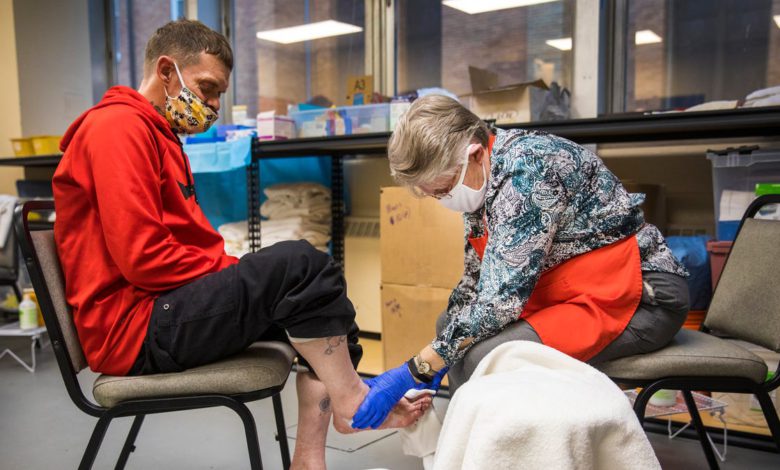
Dignity. Respect. You hear these words a lot at St. Anthony Center in Over-the-Rhine, a ministry that caters to the indigent and homeless.
It has grown into much more than just serving meals.
Since it was founded in 2017, the center has brought other organizations into its space to make it easier to reach those in need. Food, clothing, hair cuts, respite care, foot care, laundry services and showers are just some of the help offered to community members.
This month, Greater Cincinnati Behavioral Health began offering services for those with mental health and addiction issues at St. Anthony Center. The Enquirer spent several days in this 50,000-square-foot building on the corner of Liberty and Republic. Here is what’s under the roof:
Sister Bonnie Steinlage smiles at her client and says, "Let me tickle your feet."
Danny Ross, who's homeless, is more than happy to have his feet cared for. It means clean feet, a massage, clipped nails and a new pair of shoes and socks.
Foot Care for the Souls used to operate from a van in Over-the-Rhine. Now, it's at St. Anthony's twice a week in a set location, which allows for more client care.
Steinlage has been helping the poor, first with haircuts and now with pedicures, for over 50 years. She is a former Enquirer Woman of the Year.
Ross has been living on the streets of Cincinnati since 2016.
After finishing dinner in the St. Anthony Center, he took advantage of a free pedicure from Foot Care for the Souls and he couldn't stop smiling. He said he walks many miles each day, so good shoes are important.
He also uses the shower facilities, gets his clothes washed and uses the phones at the center.
James Pettway, 58, gets breakfast at St. Anthony's. Pettway stays at the Drop Inn Center but gets breakfast in the Mother Teresa of Calcutta dining room.
Without the services from St. Anthony Center and other nonprofits, many would go hungry. According to U.S. Census data from 2018, Cincinnati's poverty rate is at 25.2%. That ranks the city fifth highest in the nation among cities with populations of a least 250,000.
Mary Magdalen House bustles every day inside the St. Anthony Center in Over-the-Rhine. There's usually a line of people waiting for its doors to open each morning. Once inside, guests can take a shower in a private stall, get their clothes washed, get new clothes, personal hygiene products and a haircut.
Jenny Perez, executive director at Mary Magdalen, said, "Our guests leave here refreshed and renewed, with a restored sense of dignity."
Guests are allowed to shower each day if they choose and can have clothes laundered each day, as well. Mary Magdalen House can handle as many as 120 showers daily, with stalls cleaned after each use.
Perez said some women will come in just for female hygiene products. According to the National Diaper Bank, 1 in 4 women struggle to purchase these products.
"Our guests leave here refreshed and renewed, with a restored sense of dignity."
Richard Cottrell loads clothes into the dryer at Mary Magdalen House. Depending on the volume, the organization can utilize the five washers and six dryers each day. Clothes are inventoried when dropped off and then washed, dried, folded and are ready for pick-up the same day.
Danyale Williams, manager and stylist at Haircuts for the Heart at Mary Magdalen House, gives Melvin Mitchell, 64, a haircut and beard trim.
She said the work is rewarding because the guests are so appreciative for the free service.
Sister Bonnie Steinlage started the salon in the mid-1980s. She reached out to the founders of Paul Mitchell Systems to help with product, and they continue to do so today.
Mitchell, who is homeless, beams after his haircut at Haircuts from the Heart at the Mary Magdelan House. Before he got the haircut, he was able to shower and pick up clean clothes.
He said he really likes the St. Anthony Center and everything that's offered.
"There's no fighting, everyone is polite. And I can get new clothes."
At the Mary Magdalen House, clients can receive a free pair of shoes from Fleet Feet, a store that specializes in running shoes, apparel and gear. Shoes that are purchased and returned to the store are donated to the organization.
Many people living in poverty and homelessness battle foot issues because they're often wearing ill-fitted shoes and don't take proper care of their feet.
Perez, the executive director, said just because people are poor doesn't mean they shouldn't have a proper pair of shoes.
Robert Diederichsen, 65, relaxes in the open-air atrium at Respite Care on the top floor of the St. Anthony Center. After spending three months in the hospital, Diederichsen has been here for six months.
There is no set time on how long a guest can stay.
Ed Slater, director of Respite Care, said the clients who need it get continuing treatment after they're released from the hospital and help finding the right housing before they leave.
Lori spent a year at Respite Care at St. Anthony's before moving to a more advanced care facility.
Laurie Nelson, chief executive officer at the Center for Respite Care, said, "While Lori's length of stay was very out of the norm due to the pandemic, her treatment, specifically the intensive case management she received, was fairly typical. The center maintains a very small client to case management staff ratio compared to other case management providers."
Beckie Kaminski, a retired nurse practitioner, now volunteers her time at Respite Care in the St. Anthony Center. She talks to a new client, Michael, 53, about what they can offer him.
Ed Slater, director of Respite Care, said the clients who need it get continuing treatment after they're released from the hospital and help finding the right housing before they leave.
Lois Shegog, a retired teacher from Withrow High School, now teaches a new class in the Sarah Center at St. Anthony's called "Stitched." It's a five-week course that teaches the basics of sewing.
Luedell Ruuffin, 62, took the class to learn to make a crossbody bag. But many in the class hope the skills learned turn into a new job.
Shegog said she reached out to Aero Elite, a local Cincinnati business that employs sewing techs, about possible employment for her students. The textile manufacturing company wants its workers to have basic sewing skills before they're hired. So far, everyone who has been referred to the company has been offered a job.
Shegog said all the fabric used in her sewing classes is donated, and students choose the fabric for the class projects.
She said schools started phasing out home economics years ago and life skills like sewing and cooking were lost.
With the COVID-19 pandemic, many people, including Terhas White, 37, of Clifton, found themselves without a job. She took Stitched classes to learn to sew and hopefully start her a business selling her own creations. She said, "The class has gotten my creative juices flowing."
Mona Bronson is the chef charged with teaching families how to prepare a meal for under $10 at St. Anthony Center. She's currently creating a virtual class to begin this month.
The five-week course will teach eight basic cooking skills, such as nutrition, knife skills, food safety and budget. Though the center has a full teaching kitchen, it's had to pivot to virtual classes due to the pandemic.
Jay Olzak, food service director at St. Anthony Center, takes the artichokes out of a donation box and immediately starts thinking about how he can prepare them — maybe butter and a zest of orange.
Olzak is adamant that those who are homeless or struggling deserve good food, like anyone else.
During the height of the coronavirus pandemic, the center never closed, and meals were served at the door by employees.
Now, volunteers are coming back, including those from Xavier and University of Cincinnati, who help plate dinner. Since reopening, meals are served on disposable plates and with cutlery. Pre-COVID-19, St. Anthony's had 2,100 volunteers.
It's not an eye-catching building, but within St. Anthony Center are multiple services for homeless and indigent people.
The center is an example of a collaboration of services joining under one roof to feed, clothe and serve basic needs to those who otherwise go without.
It's all about giving care and ultimately making a difference.
Editor's note: Some individuals featured in this story asked that their full name not be published. The Enquirer agreed out of respect for their privacy.
Source link


























